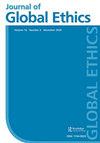Post-conflict amnesties and/as plea bargains
Q2 Arts and Humanities
引用次数: 0
Abstract
ABSTRACT I assess the force of a justification for post-conflict amnesties that is aimed at overcoming the most common objection to their conferral: that they entail retributive injustice. According to this justification, retributivists ought to consider amnesties to be justified because they are analogous to plea bargains, and because retributivists need not consider plea bargains to be unacceptable. I argue with reference to the 2001 Timor-Leste immunity scheme that amnesties conditional upon perpetrators’ not only admitting guilt and confessing but also making reparations may count as plea bargains. I show that plea bargains providing sentence discounts in return for guilty pleas, allowing offenders who accept these bargains to be punished in the absence of trials, and plea bargains offering leniency in punishment in exchange for offenders pleading guilty and providing testimony or other incriminating evidence against superiors or accomplices, may be consonant with versions of retributivism that allow less than the full measure of an offender’s deserved punishment to be exacted where necessary to maximise or expand deserved punishment overall. I argue that amnesties that are also plea bargains may be considered justified by plea bargain-defending retributivists. So too may amnesties conferred in exchange for perpetrators’ admitting guilt and providing incriminating testimony or other evidence against their superiors and accomplices, some of which count as plea bargains, since they too could in some cases maximise or expand deserved punishment.冲突后大赦和/或作为辩诉交易
我评估了冲突后大赦的正当性,其目的是克服对其授予最常见的反对意见:它们会导致报复性的不公正。根据这一论证,报应主义者应该认为特赦是合理的,因为它们类似于辩诉交易,因为报应主义者不需要认为辩诉交易是不可接受的。我以2001年东帝汶豁免计划为例指出,以犯罪者不仅认罪和坦白而且作出赔偿为条件的大赦可算作辩诉交易。辩诉交易提供减刑以换取认罪,允许接受这些交易的罪犯在没有审判的情况下受到惩罚,辩诉交易提供宽大的惩罚,以换取罪犯认罪并提供证词或其他对上级或同谋有罪的证据。可能与报复主义的版本是一致的,它允许在必要的情况下对罪犯进行不完全的惩罚,以最大化或扩大总体上应得的惩罚。我认为,同样是辩诉交易的特赦可能被辩护辩诉交易的报复主义者认为是合理的。罪犯认罪并提供对其上级和共犯不利的证词或其他证据,作为交换,赦免也可能被授予,其中一些可以算作辩诉交易,因为在某些情况下,他们也可以最大化或扩大应有的惩罚。
本文章由计算机程序翻译,如有差异,请以英文原文为准。
求助全文
约1分钟内获得全文
求助全文

 求助内容:
求助内容: 应助结果提醒方式:
应助结果提醒方式:


